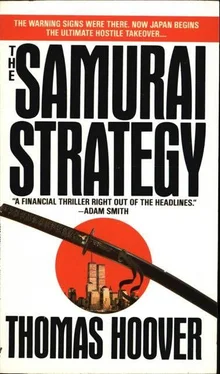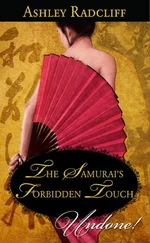Thomas Hoover - The samurai strategy
Здесь есть возможность читать онлайн «Thomas Hoover - The samurai strategy» весь текст электронной книги совершенно бесплатно (целиком полную версию без сокращений). В некоторых случаях можно слушать аудио, скачать через торрент в формате fb2 и присутствует краткое содержание. Жанр: Триллер, на английском языке. Описание произведения, (предисловие) а так же отзывы посетителей доступны на портале библиотеки ЛибКат.
- Название:The samurai strategy
- Автор:
- Жанр:
- Год:неизвестен
- ISBN:нет данных
- Рейтинг книги:5 / 5. Голосов: 1
-
Избранное:Добавить в избранное
- Отзывы:
-
Ваша оценка:
- 100
- 1
- 2
- 3
- 4
- 5
The samurai strategy: краткое содержание, описание и аннотация
Предлагаем к чтению аннотацию, описание, краткое содержание или предисловие (зависит от того, что написал сам автор книги «The samurai strategy»). Если вы не нашли необходимую информацию о книге — напишите в комментариях, мы постараемся отыскать её.
The samurai strategy — читать онлайн бесплатно полную книгу (весь текст) целиком
Ниже представлен текст книги, разбитый по страницам. Система сохранения места последней прочитанной страницы, позволяет с удобством читать онлайн бесплатно книгу «The samurai strategy», без необходимости каждый раз заново искать на чём Вы остановились. Поставьте закладку, и сможете в любой момент перейти на страницу, на которой закончили чтение.
Интервал:
Закладка:
I'd been to Tokyo from time to time for various reasons, and I'd heard a lot of stories about this lady. Fact is, you didn't have to be Japanese to know that Akira Mori was easily Japan's most listened-to money analyst. You've probably seen her yourself in snippets of that weekly chat show she had on NHK, which used to get picked up by the networks here when they needed a quick thirty seconds on "Japan This Week" or such. Her ratings had little to do with the fact she's a looker. She was, talk had it, an unofficial source for official government monetary policy. Akira Mori always had a lead on exactly what was afoot, from the Bank of Japan to the Ministry of Finance, even before the prime minister broke the news.
Miss "Mori," whoever the hell she was, had some very well placed friends. Tell you something else, she didn't go out of her way to find flattering things to say about how Uncle Sam handled his bankbook these days. Her appearance here made Noda's unorthodox office plans even more perplexing.
"We both appreciate your taking time from your schedule to meet with us." He bowed again. "We've been looking forward to having you join us at the sale."
While Akira Mori appeared to busy herself with a catalog, Noda and I got things going with that standard formality preceding any serious Japanese professional contact: meaningless chat. It's how they set up their ningen kankei, their relationship with the other guy, and it's also the way they fine-tune their honne, their gut feeling about a situation. Any greenhorn foreigner who skimps on these vital niceties runs the risk of torpedoing his whole deal.
In response to my pro forma inquiries, Matsuo Noda declared he liked New York, had even lived here for a while once, honestly found it less hectic than Tokyo, usually stayed these days at the Japanese hotel down on Park but sometimes picked the Plaza when he needed to be closer to midtown. He adored La Grenouille and thought La Tulipe overpraised. When I pressed him, he declared his favorite Japanese place to dine was Nippon, over in the East Fifties (maybe he merely liked the name, but it was my pick as well).
After he had in turn solicited my own views on Sotheby's, a couple of the galleries down Madison, and various North Italian eateries, he suggested we go on upstairs and preview the lots.
All the while Miss Mori appeared to ignore us, standing there like a statue of some Shinto goddess, except for the occasional tug at her dark hair. Maybe she didn't give a damn about this obligatory small talk, thought it was old-fashioned. Or possibly she liked the idea of being the only one not to show a hand. And as Noda led the way up toward the exhibition rooms, she trailed behind like a dutiful Japanese woman-while we, naturally, continued to talk of everything except, God forbid, why we were there.
In the first room we were suddenly in my arena-samurai swords and battle gear.
"This is your special interest, is it not, Mr. Walton?" Noda smiled, then turned to admire the row of shining steel tachi, three-foot-long razors, now being watched over by a trio of nervous guards. Sotheby's didn't need some amateur Toshiro Mifune accidentally carving up the clientele. "I understand you have a notable collection yourself."
What? What else did he know about me?
Easy, Walton. Play the game. I knew what a Japanese would expect in reply.
"Matter of fact, I've lucked onto a couple of items over the years." Then the standard disclaimers. My own painstaking collection was merely a grab bag of knickknacks, the fumbling mistakes of a dabbler, etc., etc.
Noda monitored this culturally correct blarney with satisfaction. "As it happens, Mr. Walton, I was in Nagoya last year when several of your pieces were on loan for the show at the Tokugawa Museum. I still recall certain ones, particularly that fine fifteenth-century katana, attributed to the Mizuno clan. Unusual steel. No date or mark of the swordsmith, but a remarkable piece all the same." A split-second pause. "Your reluctance to part with it was most understandable."
This man had done his homework! Or maybe he'd been the one who had tried to buy it. The steel was unusual, too heavy on copper. I'd even had a little metallurgical testing done on it down at Princeton, just to prove that hunch. But it was no big deal, merely an oddity that had fallen my way via an estate sale. There was an anonymous inquiry shortly after the exhibition opened, with an insistent offer, but I'd turned it down.
Poker time. "I was honored. Your figure was more than generous."
He laughed-bull's-eye. I watched as he glanced back at Miss Mori, maybe a bit nervously. Then he returned his attention. "Merely a small gesture for the museum. I felt it should be back in Japanese hands." He continued, his voice now sober. "You do understand?"
"Certainly." I just stared.
"Good. I see I was right." He had paused to examine a large monochrome screen. It was eighteenth century and he inspected it with only mild interest, then moved on.
I was still knocked over. Could that be why he'd retained me as his U.S. legal counsel? Because of some damned antique sword? Okay, I was already getting the idea Matsuo Noda might be a trifle eccentric, but all the same…
"Interesting." He was pointing at a long picture, part of a series locked in a wide glass case. "Honto ni omoshiroi, desu ne?'
Miss Mori was already there. In a voice scarcely above a whisper she proceeded to give him a rundown of pros and cons. It was the first time I'd noticed any enthusiasm out of the woman all night.
I checked my catalogue. The piece was a Heian hand scroll, said to be "exceedingly rare." After a few moments Noda motioned me over. "Perhaps you could give us your opinion. What do you think?" He pointed down. "The subject is intriguing. These are ladies-in-waiting for the emperor, Fujiwara. Notice the delicate refinement of the coloring, the matched fabrics, each enhancing the other like flowers in a bouquet. That was eight centuries ago, just before the rise of the first shogun, the first 'generalissimo' who would rule in the emperor's name."
When he said "shogun," niece Mori shot him a quick admonitory glance. There was some kind of unmistakable electricity passing. Something left unspoken.
"The Heian era ended with the great conflict between the Heike and Genji clans that led to the death of the ruling emperor in 1185 and the loss of the imperial sword at sea." Next he said something in guttural Japanese to Mori, obviously very intent, and indicated one corner of the painting, where the emperor sat. Her reply was quick and curt. Now, I only know a little of the language, maybe a couple of cuts above Berlitz level, but I did manage to pick up she wasn't talking about the painting. Something to do with the emperor himself, though I missed the rapid-fire delivery.
In response to Noda's question I tried to sound intelligent, saying the ink coloring looked well preserved, or some such auction house mumbo jumbo. It wasn't my thing really, which the man surely knew. He seemed to know everything else about me. After he listened politely, they switched back to Japanese and finally settled on a bid. I watched as she marked it in the catalogue-low six figures.
Walton, I thought, you're dealing with a pair of heavyweights.
By then I'd decided not to bother bidding on anything. There were too many curious twists, not to mention the building deal. Surely the ritual had gone far enough, the samurai negotiating ploy of making your adversary be first to reveal his game plan.
Why not bring up why we were there, just for the hell of it?
When I did, Noda betrayed a fleeting smile. "But of course, the building." He made it sound like some kind of trivial annoyance, a nuisance to get out of the way so we could all get back to the serious work of admiring the pretty pictures.
Читать дальшеИнтервал:
Закладка:
Похожие книги на «The samurai strategy»
Представляем Вашему вниманию похожие книги на «The samurai strategy» списком для выбора. Мы отобрали схожую по названию и смыслу литературу в надежде предоставить читателям больше вариантов отыскать новые, интересные, ещё непрочитанные произведения.
Обсуждение, отзывы о книге «The samurai strategy» и просто собственные мнения читателей. Оставьте ваши комментарии, напишите, что Вы думаете о произведении, его смысле или главных героях. Укажите что конкретно понравилось, а что нет, и почему Вы так считаете.












